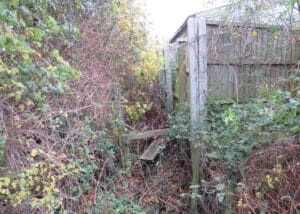Support us from £3/month
We deal with almost 1000 cases a year assisting communities, groups and individuals in protecting their local spaces and paths in all parts of England and Wales. Can you help us by joining as a member?
In January, the BBC revealed the shocking results of its survey on the state of public paths in England and Wales. Our general secretary, Kate Ashbrook, comments on these findings.

Thousands of paths, such as this one in the parish of Great and Little Kimble, Buckinghamshire (October 2023), are illegally blocked. Photo: OSS.
Paths, it showed, are blocked at 32,000 points, that is one obstruction every four and a half miles—and the problems are growing. Seventy three of the 118 highway authorities (excluding London) answered the BBC’s questions, reporting a total of 31,816 obstructions, an increase of 4,000 (15 per cent) in the ten months since the end of 2022.
Under-estimate
This is surely a significant under-estimate. Many people do not report problems or know how to, thousands of unrecorded highways were not included in the responses, and one can guess that the 45 authorities which were silent were among the worst performers.
In an interview with the BBC on an unobstructed path in Bradford-on-Avon, Wiltshire, I was asked to comment on the supposition that, with the cost-of-living crisis, authorities must give priority in their budgets to social care.
I retorted that there should not be a choice. In allocating budgets councillors must recognise that investing in paths is excellent value for money, for health and well-being, tourism, and the economy. Highway authorities have duties which they must carry out. This is why the society is stepping up its legal action against negligent authorities and serial path-blockers.
In September 1987, the Countryside Commission (predecessor but one of Natural England) announced that ‘the rights-of-way network will remain the single most important means by which the public can enjoy the countryside’. It has remained so—and countryside close to home has never been more valued.
It is now a year since the government promised, in its Environmental Improvement Plan, that (within five years) ‘the public will benefit from a new commitment to access green space or water within a 15-minute walk from their home’—but there is nothing yet to show for this. We have pressed for the dedication of land as town or village greens, safe from development with public rights of recreation. So far, zilch.
Reversed
However, the new environment secretary, Stephen Barclay, has, refreshingly, reversed some decisions of his predecessor Thérèse Coffey (for whom access provision was ‘a level of detail’ too far). Mr Barclay has announced that the environmental land management scheme will fund some permissive public access, and his officials are working on the detail. We must help them ensure that well-publicised access is provided where it is needed, and that no payment is made to a farmer or landowner whose paths are not in good order.
If this is done properly it could help to reduce the growing number of obstructions revealed by the BBC.
